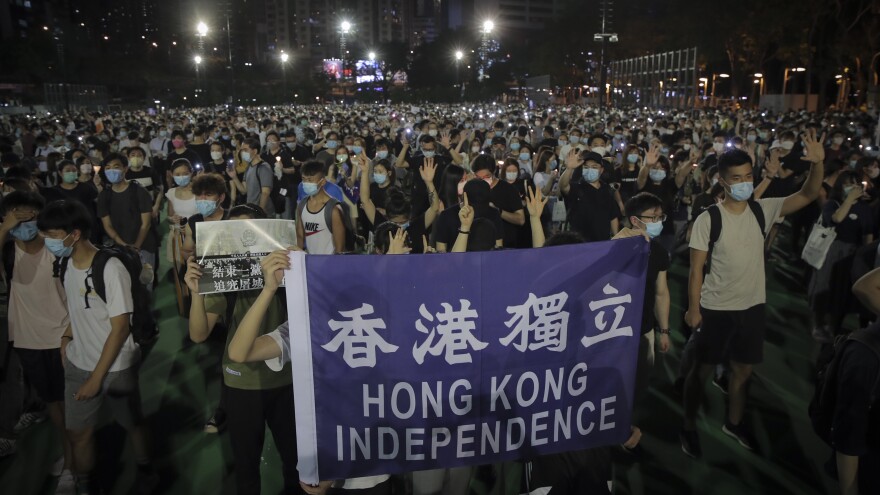Hong Kong's legislature has passed a bill making it a crime to poke fun at China's national anthem — a move that puts new limits on anniversary events marking the Tiananmen Square massacre. Under the ban, it is illegal to alter the lyrics of the anthem, or to sing it "in a distorted or disrespectful way."
The Beijing-backed anthem bill was initially introduced in January 2019, but it wasn't approved until Thursday — the 31st anniversary of the Tiananmen Square massacre in Beijing. Making parodies of the Chinese national anthem has been a popular mode of protest; it's now punishable by up to three years in prison and hefty fines.
On the night of June 4, 1989, China's military killed untold numbers of civilians and students in Beijing who were protesting for democratic and economic reforms. Talking about that night is forbidden in China, but for three decades, Hong Kong activists have held a rally every year to commemorate the crackdown's victims — until this year.
The anniversary normally brings massive crowds of people to Hong Kong's Victoria Park, many of them shouting, "Vindicate June 4! Justice will prevail!" But this year's rallies were officially canceled: Police denied organizers the permission to congregate, citing coronavirus prevention guidelines.
Even so, rally organizers encouraged people to gather in the park Thursday, risking fines and arrests. Videos and images from the scene show thousands of people filling Victoria Park as night fell in Causeway Bay. At least eight churches across Hong Kong are also hosting commemorative events; organizers are encouraging people who stay home to light a candle in remembrance of those who died.
Hong Kong's pan-democrats say the ban on the customary vigil is another sign of Beijing's control — an influence exemplified by a national security measure banning dissent, which Beijing wants to implement in Hong Kong.
"It's a direct result of China taking the wrong path after the Tiananmen massacre," says Zhou Fengsuo, who was one of the main student leaders in the sit-in protest movement in Tiananmen Square.
The unraveling of Hong Kong's autonomy has its roots in that summer of 1989, Zhou says.
"With this massacre and the CCP in power, there is no guarantee, no protection for Hong Kong's freedom," he says.
Wang Chaohua was another student leader in the 1989 demonstrations. She recalls how Hong Kong students who were then visiting Beijing pledged their support. To win democratic rights in Beijing, after all, might mean democracy could happen in the then-British colony of Hong Kong, as well.
At the time, Wang says, "We thought we had better democracy in the mainland than in Hong Kong. Hong Kong had not had much and it was still a colony."
When Wang fled China after June 4, she passed through Hong Kong. She wasn't alone: Sympathetic Hong Kongers ended up smuggling an estimated 400 activists to the U.S. and elsewhere.
At the same time, the Tiananmen protests prompted a suspension of drafters who were hashing out the Basic Law, Hong Kong's mini-constitution. It's now the strongest legal protection for the city's autonomy. Two drafters who expressed support for the protests were kicked out of the committee; two others resigned.
And Beijing took control of the drafting process, adding language to two articles in the Basic Law to criminalize subversion and allow Beijing to apply its laws in Hong Kong on national security grounds — provisions more relevant than ever today.
"People realized this is a question of what you want to fight for, not a question of what deal you want to make with Beijing," Wang says.
During debate over the national anthem bill in a legislative session last May, a council member expressed their view "that Hong Kong people should not be forced to respect the national anthem and the country through law and punishment," according to minutes summarizing the meeting.
But in Thursday's vote, the council rejected more than 20 attempts to amend the bill and voted to adopt the ban, further reshaping Hong Kong's relationship with mainland China.
Copyright 2021 NPR. To see more, visit https://www.npr.org. 9(MDAxNzg0MDExMDEyMTYyMjc1MDE3NGVmMw004))








